On June 26, our College lost a wonderful colleague and teacher in the passing of Dr. Michael Daher, director of the Henry Ford II Honors Program and faculty member in English. I am deeply saddened by the loss of my friend, Mike, who was someone I had great pride in calling my teammate. The College and I send our deepest sympathies to his family, including his wife, Nancy, and their adult children. We felt that Mike was our family, too – he was a wonderful person, a master teacher, and a revered teammate.
I met Mike shortly after I began my tenure at our College, when he and several instructors asked to meet with me and welcome me to the College. I was struck by Mike’s firm handshake and warm smile. I was impressed by how intently he listened to others and the smooth, steady cadence he used to deliver his optimistic, warm words. Perhaps most impressive was the way he looked at me with eyes that invited the nourishing exchange of ideas. From that first meeting, I came to enjoy watching the rare skill that Mike had at connecting with people—including me.
After that meeting, I learned more about Dr. Daher’s nearly four decades of public service as a teacher at Henry Ford College. His ability to communicate helped him in becoming a master teacher in all levels of education, ranging from elementary school to universities. His expertise and interests helped countless students gain knowledge in varied fields, including 19th-century American literature, Henry Ford’s role as icon, and the image of Arabs in American culture.
My interactions with Mike focused on his work with our College’s Honors Program. I routinely walk our campuses and enjoy saying hello to students and employees. On one occasion early in my presidency, I popped into the area where Dr. Daher conducted his work with Honors students. With those soft eyes and warm words, he recommended that I attend his students’ semester-end presentations in the Honors Program. I am so glad I did. Watching those presentations was, and continues to be, one of my favorite privileges at the College. It is inspiring to see eager, bright students explain what they have learned and skillfully advocate a point. Equally moving was watching my teammate Mike engage the students with questions, while serving as Master of Ceremonies. His warmth and passion that I saw consistently, from our first meeting, were always on full display. Watching him work gave me immense pride in being associated with these students and in being Mike’s colleague.
I then made a habit of popping in unannounced to Mike’s office. I did this for myself as much as for him. He always gave me a lift emotionally with his optimistic smile. I can close my eyes and see his face, feel his firm handshake, and sense the feeling of optimism he gave me.
Until now, I did not think about why I felt that way. I merely enjoyed it for the wonderful support it provided. I have heard from several of Mike’s teammates that he had a similar effect on them and on his students.
Since the news of his passing, I have been thinking more about Mike’s effect on me. I believe that Mike’s gift to me was helping me feel the immense pride I have in being associated with public service, with the teaching of students, and with the lifelong difference our caring, skilled educators make in students’ lives. His rare skill was to focus our attention on the wonderful blessing we have in educating people, simply by modeling his own joy in that fact. In this way, he was a role model for many of us. This will be part of his lasting legacy at our College.
I carry deep sorrow for our loss of our teammate. I will miss being able to pop in on him during his work or to see his masterful interactions with students. I wish I could tell my friend, in person, what a difference he made for me, and for countless lives through education.
I will miss my friend Mike. His life was an example of what makes our College great. It helps me to know how many of you had such similar experiences, and that you were privileged to call Mike your friend, teacher, and teammate. All of us are better for having known him.
May God bless his soul.
Russ Kavalhuna
President
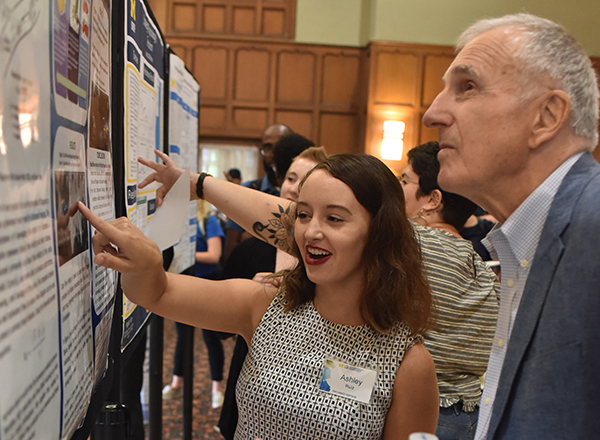
Mike Daher talking with a student presenter at the Undergraduate Research Opportunity Program (UROP) symposium at U-M Ann Arbor in 2018. He was deeply interested in and proud of the work of HFC students, and dedicated to their success.
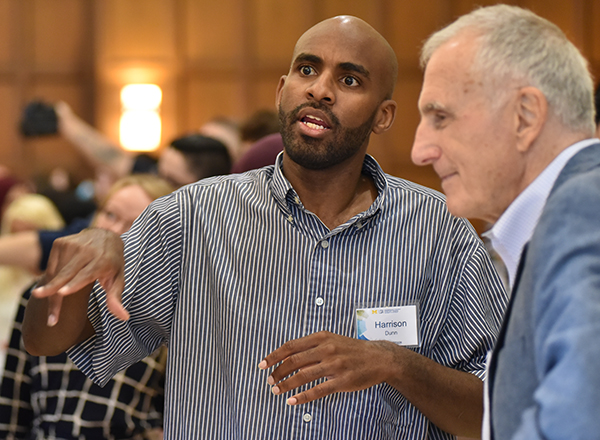
Mike Daher talking with a student presenter at the Undergraduate Research Opportunity Program (UROP) symposium at U-M Ann Arbor in 2018.
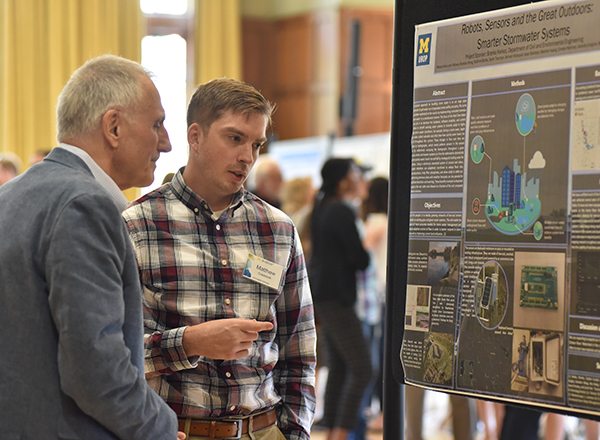
Mike Daher talking with a student presenter at the Undergraduate Research Opportunity Program (UROP) symposium at U-M Ann Arbor in 2018.
I think I'll read some Walden today
by Angela Hathikhanavala, English faculty member
Many of you have attended Honors Assemblies at one point or another (the required beginning-of-every-semester meeting for all Honors students, mentors, and various other people connected to the Honors Program). Anyway, the assembly was usually a pretty rote affair -- announcements, reminders, paperwork, more announcements -- but in January 2017, the assembly happened to fall either just before or just after inauguration day, and it was clear some students in the room were feeling low. Mike broke from his usual script to eloquently provide two book recommendations -- Aldous Huxley's Brave New World, about "the perils of staying asleep," and Thoreau's Walden, about "the joys of being awake." I have no idea how many students took note of those recommendations, but I'd like to think at least a few did.
I think I'll read some Walden today.
He showed students that words can pull us up
by Betsy Cohn, English faculty member
First, even though Mike was a man of words, words can't do him full justice, but those who knew him will be able to instinctively fill in the gaps, I hope. Mike's words were often poignant, elegant and learned and also gentle and compassionate. I love how he showed students that words can pull us up. He showed them and many of us, too, how an amazing intellect can be framed by equally amazing humanity and warmth.
I have fond memories, including his smile, which carried into his eyes. I would be hard-pressed to name another teacher who's been such a light to students and who's helped so many succeed. I remember, maybe at a brown bag, when he showed a video of a class that he'd run in seminar style and how impressed I was by the level of discussion and by how artfully he facilitated the discussion while saying very little. I suspect that for many people who are as knowledgeable and inquisitive as he was, standing to the side would be hard, but he was very giving to students in that way too. He believed in them. Given his collegiality, I think he also believed in us.
I will miss his earnestness, his dedication, and, from a strictly personal perspective, his smile and quiet greeting when we passed in the hall. It might seem strange to focus on the kind smile of such an accomplished, intellectual person, but he boosted my spirits. I wish I'd told him that.
He still had so much to say and do
by Gary McIlroy, English faculty member
It is a shock, to say the least, and a deep sadness to lose one of our own. And it's painful to see the silencing of someone who still had so much to say and do.
Mike was one of the last "Old School" members of our department, with a deep and rich literature-based education. He was adept at teaching writers as diverse as Tolstoy, Dostoevsky, Dickens, Oates, Morrison, Carver, Thoreau, Ellison, Plath. He was also creative in pairing established writers with contemporary ones and exploring, across a broad spectrum of traditions, themes like work, race, and family.
In line with Angela and Betsy's comments on Mike's student-focused teaching, Mike was also passionate about introducing students to transfer and scholarship opportunities they might never have come across on their own, or if they had, might not have had the confidence to pursue.
Getting students to think outside of the boundaries or bubbles of Greater Dearborn and S.E. Michigan was important to him. He was especially intent on maintaining the pipeline to UM-Ann Arbor and would regularly take HFC students to AA for transfer seminars.
On a personal note, Mike was always supportive and encouraging to me as well as intellectually engaging, if not at times a bit intimidating. I always felt his mind was working faster than mine and with more abundant resources.
I am sure you will agree that all the wonderful things we can say about Mike will only be a small fraction of his contributions to this school and community. There is never a satisfactory time to say goodbye to such people. I mourn his passing.
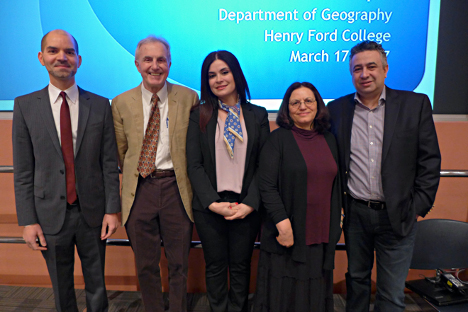
His elation was palpable, his smile wide, and his words elevating
by Tarek A. Joseph, faculty member, Geography, Social Science, Arab Cultural Studies
I first met Mike in 1998, my first full-time year at HFC. Over the years, I had the privilege of working closely with him in a number of areas, particularly the Arab Cultural Studies Program, the Honors Program, and the Transfer Bridges to the Humanities Mellon grant. What was apparent from my earliest experiences with Mike was his genuine concern for students and colleagues. Mike cared deeply about people and showed that concern on a regular basis.
As an Arab American faculty member, he possessed a heartfelt responsibility and passion to promote the depth and breadth of the Arab American experience, in order to counter the pervasive misperceptions and negative stereotypes of Arabs and Arab Americans. Those of us who were fortunate enough to serve with Mike on HFC’s Arab Cultural Studies Program Advisory Council witnessed this conviction during every interaction.
One of the Arab Cultural Studies Program’s most successful educational events was Mike’s brainchild - a half-day mini conference entitled “Arab Americans: A Spectrum of Identity and Perception.” After an overview and formal presentations, this event included personal testimony from Arab American faculty members, staff and students. When it became clear that these testimonies directly resonated with the audience, Mike’s elation was palpable, his smile wide, and his words elevating. The success of that day only increased his enthusiasm to continue working to humanize Arabs and Arab Americans through the educational process with direct, personal outreach.
To that end, Mike’s personal encouragement and enthusiastic support was instrumental in the development and launch of my “GEOG 221: Geography of the Middle East” course, which now is successfully offered each fall and winter semester.
In more recent years, in addition to group meetings, Mike and I met fairly regularly one-on-one, usually in his Honors Program office, but sometimes out in the community after a meeting at Wayne State or The University of Michigan in Ann Arbor. I can honestly say that there was not a time when Mike did not ask me about my wife and children. And as he would listen with a grin and a twinkle in his eye, he took genuine delight in the stories that I would share with him about the latest life stages of my three young boys.
I had the utmost respect and appreciation for Mike’s professionalism, sense of commitment, keen insights and his warm and gentle nature.
I will miss him greatly. Mike’s example and memory will serve as an inspiration to countless students, as well as to me, in my life, both professionally and personally.
Realms they would never have found
by Linda Brandt, Biology faculty member
Mike made so much possible. His encouragement to allow students to follow their hearts in their Directed Studies inspired the Honors Students with whom I worked and also inspired me to follow their dreams, whims, and deepest intellectual thoughts into realms in which they would not have dived, if not for Mike.
A commitment to inclusion and diversity of ideas
by Imad Nouri, faculty member and Licensed Professional Counselor
I am deeply saddened by the passing of my dear friend and colleague Michael Daher. I met Mike some twelve years ago when under his leadership and vision, a group of faculty from different disciplines decided to form the Arab Cultural Studies Program. A third generation Arab-American, Mike never forgot the roots of his paternal grandfather who migrated from Zahle, Lebanon, in the late 19th century. As a Fulbright scholar, Mike's genuine pursuit to explore Arab life and culture led him to Syria in 1985, where he lived for two years teaching writing and literature at the University of Damascus.
Working with Mike throughout the years, I consider myself lucky and blessed to have met such a gentle and brilliant man who had dedicated his life in the pursuit of knowledge, culture, and justice. Our journey included showcasing films, coordinating cultural events of music, poetry, and literature. Mike's commitment to inclusion and diversity of ideas lead him to cultivate projects and events that brought people together to speak truth to power about complicated subjects in religion, culture, and identity. I will miss Mike's generous spirit, his attentive presence, and his comforting smile. I will miss his gentle soul and firm commitment to justice. But most of all I will miss his guidance, mentorship, support, and his friendship.
Wisdom and experience to remove barriers
by Elizabeth Preston, Financial Aid Associate and Diversity Task Force member
I am heartbroken to learn of Dr. Daher's passing. He was such a wonderful person with whom to work. Dr. Daher and I got to know each other while working together on the Diversity Task Force. In these meetings, we all could rely on his wisdom and experience in working to remove barriers for both our students and employees. His vast knowledge provided opportunities to view things from various perspectives, which was invaluable. I likewise had the great pleasure of working with Dr. Daher in his capacity as Director of the Honors Program and as well as a member of our great faculty. I would often message him with questions regarding students and he was so quick to respond with a helping hand. He always exuded a kind and generous nature as well as extreme patience. He was a pure joy to work with and will be missed terribly. I am keeping Dr. Daher and his family in my thoughts and prayers.
Lovely memories of the Honors Program and the HFC family
by Huda Sedaki, class of 2016
When I first came to the U.S., I had no certainty about the funding of my university years. After passing the placement tests, I was directed to HFC's Honors Program, where I met Dr. Daher. The interview was so friendly and nice. Dr. Daher and Dr. Laura Yeakel pushed me to feel confident in myself, and enter the Honors Program. After two years, I graduated with honors from HFC and went on with my life with lovely memories of the Honors Program and HFC family. May his soul rest in heaven. Best wishes to his loved ones.
Immeasurable impact
by Ashley Ball, B.A., Biology; L|E|C|O|M Distance Education School of Pharmacy Doctor of Pharmacy Candidate, Class of 2022
To Dr. Daher:
Your impact on this earth, Henry Ford College, the Honors Program, and students like me--is unmeasurable. My Honors trip to Portugal and my summer research at UMAA were both life-changing and never would have happened if it wasn't for you and Dr. Yeakel. If I can contribute to this world a fraction what you have, my heart will be filled. Bless you and your family.
Peacefulness
by Eva Kelly, assistant to the associate dean, School of BEPD
I will miss the sense of peace when we spoke and passed each other with a smile and hello! I will miss his peacefulness.
Live in the Layers
by Nancy Owen Nelson, Emeritus, Adjunct Instructor
With the passing of Mike Daher, yet another piece of my life at Henry Ford Community College breaks way. In Fall 1981, Mike and I, along with Dr. Doris Kittendorf and Dr. Ed Chielens, were hired into the English Division as new instructors. It was a very different time at the college, one which, with all its imperfections, represented a “golden era.” There was a recession, and the auto industry suffered, but we were, for the most part, a hopeful faculty. Over the next few years, the College would move toward a holistic view of educating the whole student--body, mind, and spirit. Mike was always in the center of this growth. As chair of the Honors Program, he created transfer opportunities for students to universities. Mike’s mantra on the webpage of the Honors Program was “Be more than a student--be a scholar.” He, along with Dr. Rick Bailey, implemented Henry Ford’s NEH seminar on “Work and Culture: American and Confucian Values.” They brought in academic specialists from all over the country to lecture on cultural values embodied in work. Out of the Center for the Study of Work, students and faculty gathered oral histories on the meaning of work.
When I returned to the College after six years out of state, Mike welcomed me back in a way that made me feel I was “coming home.”
Throughout these almost 40 years, Mike was a steady presence for me at the College. He treated me with respect. His conversation was measured and thoughtful. He was slow to anger, but if he did care about an issue, he would respond honestly. He encouraged me to participate again as Honors faculty, even though I was teaching as an adjunct. His academic studies in 19th century American literature and Thoreau grounded him in the historical American ethos, while his work with the image of Arabs in American culture illustrated a life-long effort to study American culture--as it evolves, as it blends with other cultural aspects, as it is about becoming, not stasis.
For me, Mike Daher was the penultimate “gentleman and scholar.” He lived and breathed and was his work, both teaching and scholarship. His life reminds me of Poet Laureate Stanley Kunitz’ poem “The Layers”:
Live in the layers,
not on the litter.
This is how Mike Daher lived, in the layers. I will miss him very much.
Some classes are simply unforgettable
by Kamal Abuarquob, M.S., Research Scientist, Greater San Diego Area, California
It’s been roughly 13 years since the last time I sat in Dr. Daher’s Great Works class, yet I still remember the moment as if it were yesterday. Some classes are simply unforgettable. Great Works allowed students —with so many different schools of thought, ethnic backgrounds, and orientations, to gather around one table, discussing wide-ranging matters; including politics, love, religion, science, and history. Adding to the unforgettable nature of the class, Dr. Daher’s delivery of the material made it special —something about the way he asked the questions, mediated the students’ arguments, and drew conclusions.
Then there was Dr. Daher’s generous will to help and his commitment to the Honors Program’s mission. Working closely with other Honors Program champions at HFC, Dr. Daher was at the front line helping students navigate through university applications and pursue their dreams beyond HFC. Speaking for myself, it was during his class when Dr. Abraham stopped by and announced me the winner of the 2006 Jack Kent Cooke Scholarship. By then, Dr. Daher (along with Dr. Abraham and Dr. Yeakel) had already been helping me with applications; including one to the University of Michigan Ann Arbor, where I ended up going.
It’s true that Dr. Daher leaves behind an empty space that is hard to fill. But it’s also true that he leaves behind a legacy that lives on, in the form of the magnificent impact that he has left on so many students. For this impact, I’m truly grateful, and I’m sure many other students feel the same.
May you Rest In Peace, Dr. Daher, and may your family find patience and tranquility during these difficult times.
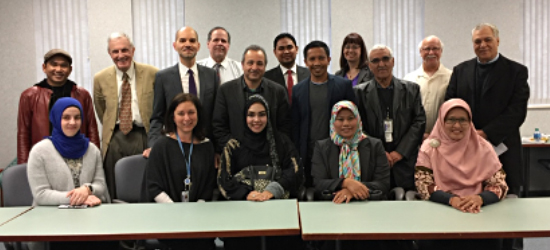
Guidance, wisdom, leadership ability, and vision
by Sam Bazzi, faculty member in Mathematics and HFC Arab American Community Liaison
President Kavalhuna truly expressed the feelings of all of us who got to know and work with Mike.
I had the chance to work closely with Mike since the creation of the Arab Cultural Studies Program Council. For the past years, I also worked with him on the Honors Program Council and in my capacity as the Arab American Community Liaison. Mike was leader by all means, a great listener, very humble with a smile, had the interest of students and the community in mind all the time. His goal was always to deliver a first-class product be it a task, a project, an event, or a collaboration. He had great confidence in our students’ abilities and wanted to provide students in the Honors Program and other programs with the best possible opportunity. This was evidenced by his work to collaborate with top schools in the state including the University of Michigan Ann Arbor through the Mellon Foundation, the collaboration with Albion College, and Wayne State University to name a few. He strongly believed in strengthening relationships with the community we serve. He was the first person to lobby for creating the position of the community liaison.
When he shared with me the news that he was planning to retire soon, I wished him a happy retirement because he deserved it after so many years of service, but I told him, it will be a challenge and in particular for the ones who worked directly with him, including myself, to adjust in the absence of his guidance, wisdom, leadership ability, and vision.
Rest in peace, my colleague and friend. You will always be missed by all people who got to know you or had the chance to work with you.
In the best kind of leadership, he gave others the opportunity to lead
by Jolie Stepaniak, Biology Faculty Member and Chair of HFC Honors Program
Mike was exceptional in many ways.
First, he was a scholar with a true commitment to academic excellence at HFC.
Second, he was industrious and energetic. He was actively involved in so many parts of the College that I marveled at his ability to do so much. I know him from his work in the Honors Program, which he approached with enjoyment and enthusiasm. It was difficult to remember that he had been at the College for so long, because he approached every task with the eagerness of someone just starting out.
Third, he was a person of good character. He was fair and honest, and always had the best interests of students at heart. He was the embodiment of the best aspects of the College’s mission. His kind and gentle demeanor made him approachable and delightful to work with. He was, however, no pushover. He had incredible toughness and persistence and was unafraid to go toe-to-toe with anyone to ensure the integrity of the Honors Program. He was optimistic and, in the face of setbacks and challenges, helped others believe that there were always new opportunities. He had an excellently subtle and complex sense of humor.
Fourth, he was a true collaborator. Mike encouraged meaningful communication and teamwork. He valued everyone’s contribution and appreciated different points of view. His broad vision transcended the College structure and the boundaries of academic disciplines. Mike mastered the art of listening, and anyone who spoke with him received his undivided attention. In the way of the best kind of leadership, he gave others the opportunity to lead.
I wish Mike had had the opportunity to enjoy his retirement. If he enjoyed it half as much as he enjoyed his work, he would have had a great time.
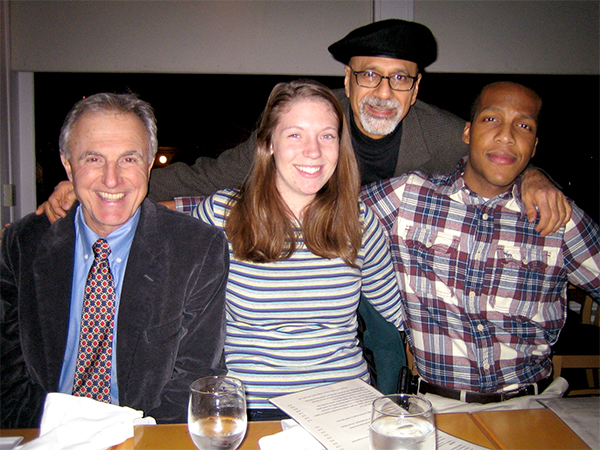
Let us celebrate Mike Daher
by Nabeel Abraham, PhD, retired Anthropology Instructor (1985-2013) and Honors Program Director
It’s been five days since I received news of Mike’s passing, and still the shock and sadness persist.
Mike and I first met in 1980. I had just returned to Detroit from living on the East Coast. Mike was an integral member of the Arab American Media Society (AAMS), a collaborative effort to develop programming about Arabs, Islam, and Arab Americans for local public radio and television. Mike researched and wrote the scripts for programs like the award-winning “Arabesque” radio show that ran on WDET for several years.
Mike subsequently produced his own commentary segment on WDET.
Everything Mike did was thorough, well-researched, and erudite. When he could, he drew connections to American literature which was close to his heart, most notably the works of Emerson, Melville, and Thoreau, among others. He interviewed world-famous intellectuals like Noam Chomsky and Edward Said, as well as many other professors and diplomats. Mike’s interviews were well researched and thought out. He never failed to unearth memorable insights. His questions were succinct, employing minimal verbiage.
In 1985, I joined Mike and his Arab American Media Society collaborators on a fundraising trip through the Arab/Persian Gulf. We toured five Gulf countries plus Jordan in about two weeks. Mike was a third-generation Lebanese American. This was his first trip to the Middle East. He avidly sought material for future shows. One notable example comes to mind. In the hotel lobby of the Diplomat Hotel in Bahrain, a trio from the Philippines dressed in Santa Claus suits were singing Christmas songs. Men in traditional white robes, sandals, and iconic Arab headdress were milling about, while mothers in traditional dress where taking their children to visit Santa. Mike seized on this post-modern moment to record material for a show titled, “Christmas in Bahrain.” It was a hit back home when it played on public radio.
Mike subsequently received a Fulbright Professorship to teach American literature in pre-Civil War Syria. He developed a deep rapport with his Syrian students and likewise formed a love for the country and its people. His experience informed his teaching back at HFC (Henry Ford College), where he taught for some 40 years. His Syria experience also informed opinion pieces which he wrote for the Detroit Free Press.
Mike was a great asset when he joined me in reorganizing the Honors Program. His background in having completed the Great Books program at the University of Notre Dame inspired his drive to inject Great Books into the Honors curriculum at Henry Ford. Mike drew up the reading list for the Honors Great Works course that seemed daunting at first to our students. He also designed the course around a seminar format. Gradually students overcame their apprehensions and raised their reading and analytical skills as their self-confidence soared. The course served as the springboard for Honors students to meet head-on the challenges of major transfer institutions like the University of Michigan, other major universities, and even Ivy League schools. In this regard, Mike worked closely with Leah Mantei and Joseph Headen to help secure full tuition and housing scholarships for the two HP students to complete their undergraduate education at Connecticut College. One example of many (see photo).
Mike believed in quality education, refusing to tone down the curriculum because this was a community college. He believed our students would rise to meet the challenge. Indeed, the vast majority did, and this very fact encouraged them to excel even further at their transfer institutions. Mike believed in the value of literature in life and took his role as teacher seriously. Not surprisingly, he earned the great respect of students and colleagues alike.
Upon my retirement, Mike assumed the post of Honors Program Director in 2013. He continued the tradition we had started together. He brought innovations to the curriculum and initiated new programs. It made my leaving so much easier knowing the Program would continue to prosper under Mike’s stewardship.
I would like to close with this condolence note, which I received from my brother Sameer, who originally introduced me to Mike when the two of them were working together in the Arab American Media Society:
“I always liked Mike. I found him intelligent, reasonable, and open. He also knew when to stand his ground. My interactions with him are limited to my time in the Media Society and related community events. I feel sadness at his passing, but let us celebrate Mike Daher.”
Indeed, let us celebrate Mike Daher.
He put in the work to create experiences like mine
by Sophia Hart, A.A. Fine Arts and Ceramics, Class of 2017; B.A. Illustration, Kendall College of Art and Design, Class of 2019
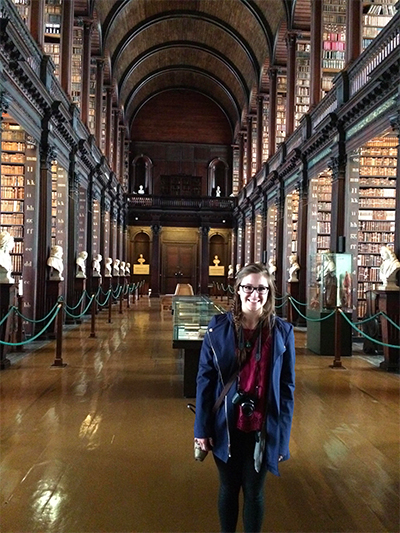
Dr. Daher was an inspiring leader and a fierce ally to all students of HFC. Together with Dr. Yeakel, they led an incredible group of bright students, myself included, who acquired the confidence to pursue their dreams after their time in the HFC Honors Program. I remember applying for the program and meeting Dr. Daher for the first time, thinking “How am I good enough for this? Can I do this?”
While it was incredibly challenging and a lot of hard work, he taught me that I was good enough. One of the best opportunities of all my undergrad was traveling abroad to Trinity College in Dublin, Ireland, with Mrs. Geraldine Grunow. I would not have had that experience if it wasn’t for Dr. Daher. He personally emailed me asking if I would take the study abroad trip, and believed that I was capable of producing an exceptional project. Because of his trust in me, I formed one of the best relationships I’ve ever had with a teacher and mentor, as Mrs. Grunow and I still regularly talk. I will be forever grateful to him for that, and for all the work he put into the program to create experiences like mine. He truly cared for all teachers and students and it showed. He will be deeply missed.
Photo courtesy Sophia Hart: In the Main Reading Room, Old Library, Trinity College, Dublin, during an Honors Program study abroad trip facilitated, in part, by Mike Daher
Highlighting the special attributes of the College and Dearborn and Detroit
by Geraldine Grunow, retired English faculty member
I first got to know Mike Daher in the 1980s through our small GE radio that played WDET in our kitchen much of the day. Along with other Wayne State University presenters, he provided wonderfully eclectic commentaries once a week; for no particular reason, I remember best his commentary in praise of push lawn mowers!
When I met him in person at the College, I learned that his enthusiasm and knowledge encompassed much more than lawnmowers. Mike was a scholar, deeply versed in world literature, and he passed his enthusiasm on to his students, even to those who did not come to his class very well prepared for his rigorous courses. When I worked with his students in the (former) Learning Lab, I learned how these students appreciated their good fortune at being taught by a learned instructor who took great pains to ensure that his students succeeded. One of them proclaimed, “Dr. Daher has read everything!”
Mike was wonderfully creative about adapting projects to highlight the special attributes of the College and the cities of Dearborn and Detroit. I assisted him when he directed a National Endowment for the Humanities-sponsored Workshop for community college faculty from all over the country. The workshop, “Henry Ford and the History of American Industry, Labor, and Culture,” focused on one of Mike’s favorite subjects of scholarly study. Before and during this workshop, Mike planned, negotiated, and checked meticulously, scoring a unique group of morning lecturers and afternoon experiences for participants. Among other activities, they conducted research at the Benson Ford Library at The Henry Ford, had lunch at the Henry Ford Estate, learned about the Diego Rivera murals at the Detroit Institute of Arts, explored the Ford Piquette (Model T) plant, and visited the sites of the UAW-sponsored Ford Hunger March (1932) and the Battle of the Rouge Overpass (1937)—all in addition to reading many related books and articles. This would have been an exhausting week for everyone, but for Mike’s contagious enthusiasm and happiness!
Another project Mike organized was a Summer Study Abroad pilot program, an experiment to explore whether community college would benefit from a modified form of the Semester Study Abroad program. Mike announced his ideas to me—with obvious glee at his ingenious pairing of interested Honors Program students with faculty who were familiar with a country overseas and had a useful connection there. As a result of Mike’s tireless advocacy, funding was secured for travel for about half a dozen gifted students and three instructors, who studied for one to three weeks in Ireland, India, or Portugal. I was delighted to be able to take a wonderfully talented and hard-working Fine Arts student to Ireland to study the art of the Book of Kells and other Irish artifacts. I don’t think Mike slept much while everyone was overseas; he would, he said, keep his phone with him all the time, ready to answer WhatsApp calls whenever we might need him. Fortunately, we all came back safely, everyone filled with renewed or expanded interest in their field of study.
It is significant that tributes to Mike have been written by members from many areas of the college community. Because of his genuine kindness and humility, Mike was able to work across disciplines, departments, and job descriptions; he wanted projects to succeed for everyone’s sake, and he encouraged everyone to take risks to make this happen.
Mike and I often shared updates on our children; he had a wonderful way of sympathizing with their setbacks and rejoicing in their successes. It’s especially sad for me to think that Nancy, their children, and other members of Mike’s family will not be able to enjoy his good company in his retirement. I hope they know how much Mike was respected and loved by his colleagues and friends at the College—and how much we will all miss him, too.
He took me under his wing
by Mary Assel, retired faculty member and director of the English Language Institute; author of A Sprinkle of Dust
I have found that one of the hardest things to do in life is to express how I feel after losing someone I love and respect. The sudden loss of my friend Mike Daher was heart-aching. I respected him for all the humane things he had done to improve my life and the lives of thousands of students who flooded through his doors. Those of us who know Mike, know that he never hesitated to take on a project — no matter how complex, and he would simply make it happen.
Mike was a friend and colleague of mine for over 25 years. I had first met him, his wife Nancy, and his daughter Elizabeth when I taught at the high school. I admired his fatherly concerns when there was nothing for him to be concerned about. When I began work at the College, he welcomed me with open arms. He called me the night before my first day to offer me comfort and support. He walked me through the College’s culture and politics and gave me heads up on conferences he believed would support the English Language Institute initiative. He shared his fascination with the ELI and how he believed that together, we could create a new platform for Arab women to share their cultural and literary prowess. We worked together for almost a year to start our first annual conference on “The Many Faces of Arab Women,” and that was just the beginning. He took me under his wing and taught me how to recruit speakers and authors. His goal was to offer HFC students and faculty a blended view of successful women from around the world with the intent to initiate a public discussion. Mike took advantage of the resources and riches HFC students had to offer and made it a point to display their endeavors in every corner of the College. He loved his profession, his students, his colleagues and anyone he knew would benefit the College’s culture and heritage. Mike was special, and I will miss him.
Dr. Michael Daher, a life to celebrate
by Katherine Varchetto Grahl, Retired English/ESL Instructor and former Associate Dean
The news of Dr. Michael Daher’s passing shocked and saddened me. I had the privilege and pleasure of working with Mike for almost 30 years at HFC; it is hard to think of the College without his presence.
Prior to my tenure in the English Division, I knew Mike as the quintessential English professor. His dignified, yet congenial, demeanor, his knowledge of literature and involvement in special programs, his belief in rigorous study and scholarly research all lent to this impression. When I joined the English Division in 2004, I also quickly became aware of his collegiality, and his dedication to cooperation and inclusivity for the division and the College. He was active on so many division and College-wide committees, bringing his innovative ideas, lending sound counsel, and adding his own perspective on various questions, topics, initiatives, and policies. He helped to shape our programs, the English Division, and the College in so many ways, always to the good.
When I became Associate Dean and the College underwent its first major reorganization, both the Honors Program and the Arab Cultural Studies Program became part of the newly-formed Communications Division. Mike was the Director of both programs, and I technically became his “supervisor.” While I may have provided the administrative umbrella, Mike needed no supervision. I quickly recognized his unsurpassed work ethic and dedication to the students and faculty associated with both programs. With respect to the Arab Cultural Studies Program, Mike worked with faculty to develop and administer our first proficiency examination in Arabic language. Given the College’s location and demographic, this was long overdue and just one of his many contributions to this program.
Mike was tireless in his promotion of the Honors Program and the College, working hard to establish strong relationships with other colleges and universities nationwide to provide pathways for transfer and facilitate a smooth transition for our HFC students. I saw this clearly as the parent of an Honors Program student myself. Mike mentored my daughter through the program and was instrumental in her transfer to the University of Michigan, Ann Arbor, a choice that turned out to be the right one for her and for me. He also continued to support her and provide her with opportunities to speak at Honors Program events once she graduated. I will always appreciate his mentorship of and confidence in her.
With a warm, caring personality and a ready smile, Mike Daher went quietly about doing his job----and doing it exceptionally well. He will be missed in so many ways and by so many people. As we mourn his passing and our loss, let us also celebrate his life.
Enthusiasm for creating an academic program in Arab Cultural Studies
by Hashim Al-Tawil, Ph.D., faculty member, Art History and Arab Cultural Studies
The unfortunate and untimely departure of Dr. Mike Daher is a loss to all of us. I met Mike back in 2004 when I started my full-time art history teaching at HFC. His enthusiasm for creating an academic program to preserve and teach Arab culture was firm, and with consequent development, the Arab Cultural Studies Program (ACSP) was born. Mike worked tirelessly to consolidate the program and encouraged all ACSP Council/Faculty members to develop courses for its foundations. The program connects various departments and disciplines with diverse academic offerings in Arab cultural studies: Art, Art History, Language, Literature, Geography, Religious Studies, and other Social Science disciplines. I think it is important to continue the works of ACSP and to honor Mike Daher’s academic contributions to HFC progress.
Mike and I also worked as board members in the Michigan Chapter of Fulbright Association, where he exhibited professional academic effort.
We will always remember Dr. Daher.
He was so proud of his students
by Laura M. Herbert, PhD, and Tiffany Browne, Academic Advisors, Newnan Academic Advising Center, University of Michigan Ann Arbor
We had the opportunity to work with Dr. Michael Daher as part of the Transfer Bridges to the Humanities program between HFC and the University of Michigan Ann Arbor. Dr. Daher's vision for and commitment to the honors program at HFC were apparent from the minute we met. He was so proud of his students. He was clearly devoted to helping them pursue excellence at HFC and find the best academic path forward after. We are sorry we did not have the chance to work with him longer. Thank you for honoring his work!
Honoring Dr. Daher
by Arlana Cain-Harris, Freelance Writer (originally published in the Mirror News, September 2021
Two weeks ago, I was looking for something in my basement. I found an old assignment I kept from Dr. Daher’s class; it was one of the only papers he assigned in person, as COVID-19 caused us to transition to online school. We had to write about The Catcher in the Rye by J. D. Salinger. One theme in the book is life after losing a loved one, and thinking about that saddens me. A few days after finding this old essay, I read the details of Dr. Daher’s memorial on the school’s website. Immediately, shock consumed my being, and I could not move for a moment. I mean, I was smiling at the notes he left on my work a mere few days earlier.
Dr. Daher is someone I repeatedly talk about because he was a phenomenal instructor. Writing is my passion, and I cherish the great teachers that come along. He was reassuring and respectfully corrected me when needed. I enjoyed going to his lectures because he didn’t teach generically. Instead, Dr. Daher shared his life experiences when they related to a lesson. I genuinely listened to everything he expressed, and I could tell he appreciated it.
I was flattered whenever he asked me to share my thoughts for the class discussions. He always seemed interested in what I had to say. He gave everyone a chance to speak. I found myself missing our in-person classes when the pandemic began. Just two and a half weeks into the semester and then he became ill. Fortunately, he returned a few days before mid-winter break.
Toward the end of the semester, the class had to go virtual due to the COVID-19 pandemic. There were no more in-person discussions, which was my favorite part of his class. He emailed us every assignment and continued to be a helping hand whenever he could. Dr. Daher ensured that I understood everything when I needed clarification. Also, I loved that everything he assigned triggered critical thinking. He encouraged me to dig deeper when I only touched the surface of a topic. For example, when I analyzed a chapter from Invisible Man by Ralph Ellison, he proposed ideas that I didn’t think of, and that is what I admire the most about any teacher. Push me! Aid me to betterment! That is what Dr. Daher did, and I am forever grateful.
I will unceasingly honor Dr. Daher.
Photos
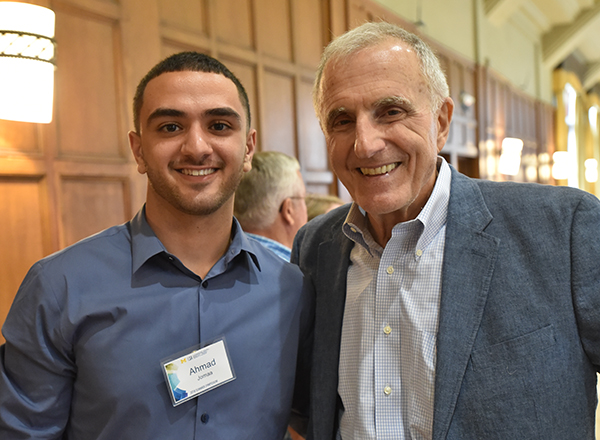
Mike Daher, proudly standing with HFC students at the UROP event in 2018.
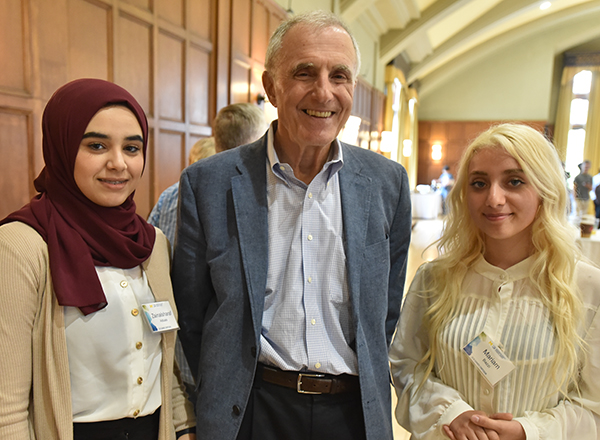
Mike Daher, proudly standing with HFC students at the UROP event in 2018.
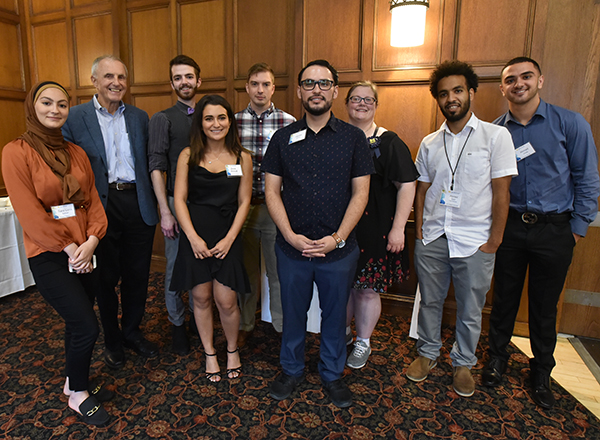
Mike Daher, proudly standing with HFC students at the UROP event in 2018.
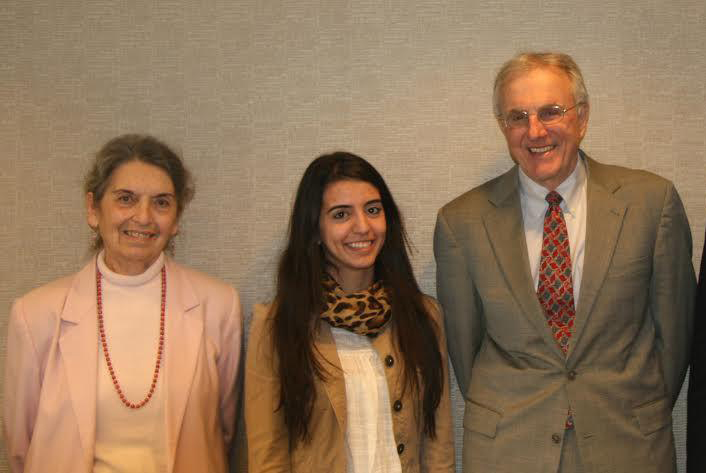
Mike Daher with Honors Program Associate Director Laura Yeakel (left) and Honors student Diana Jomaa, who won the prestigious national Jack Kent Cooke Scholarship in 2014.
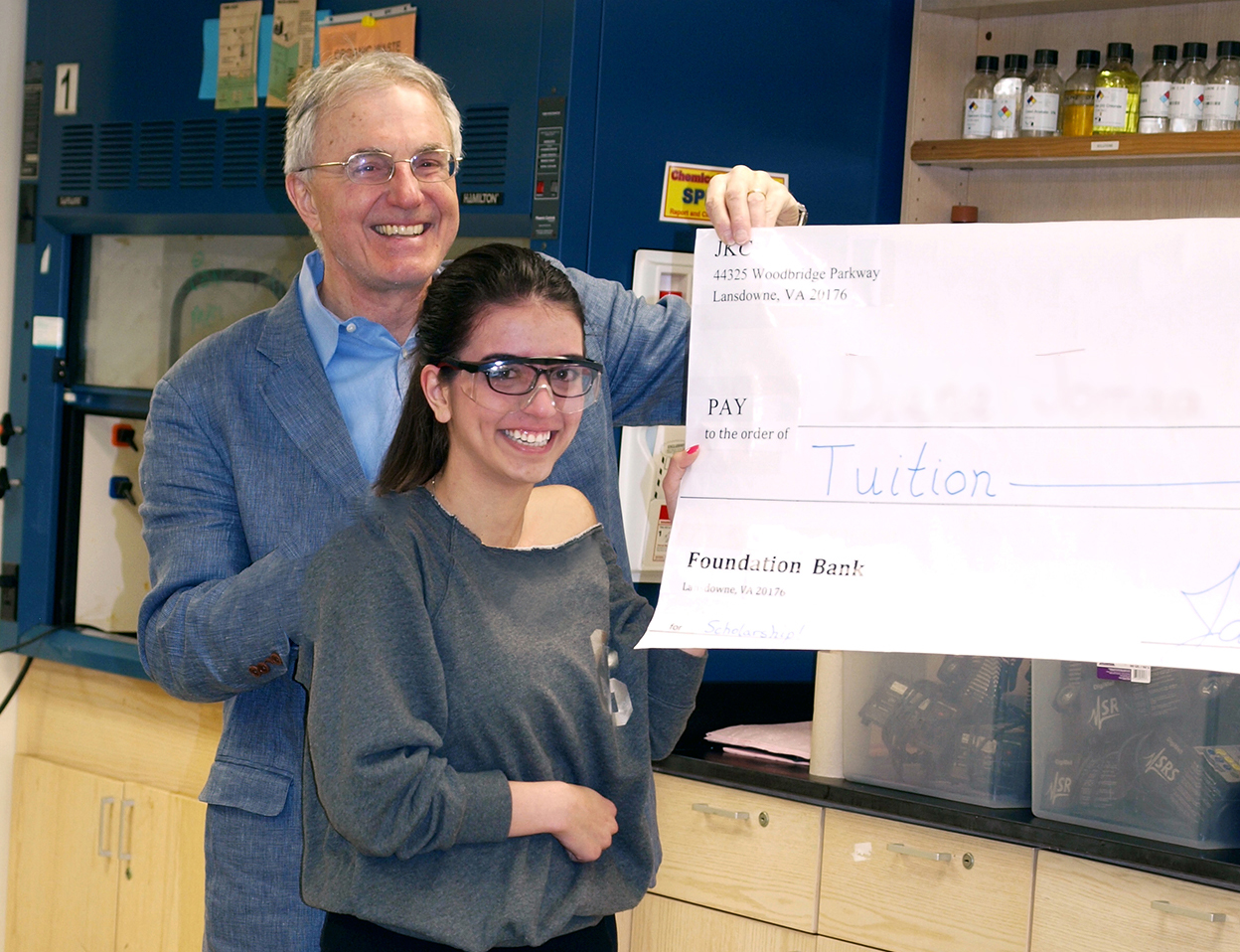
Mike would help students in any way he could, including finding ways they could afford their education.
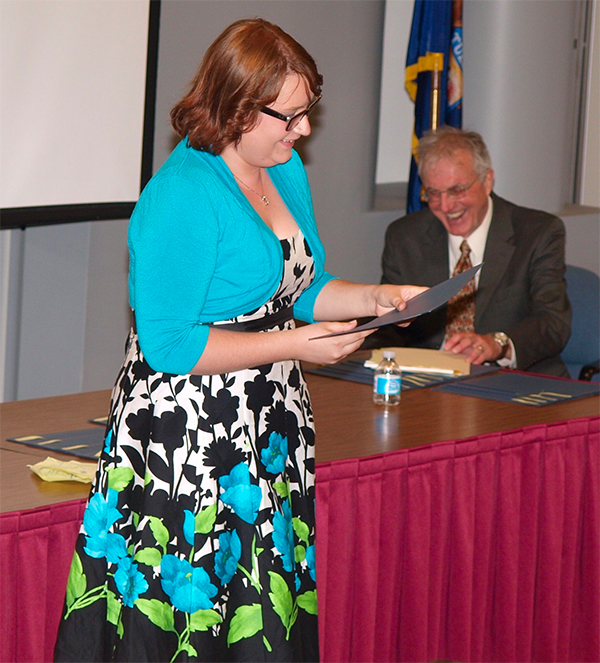
Mike has a moment of levity with students at an Honors Program event in Forfa Auditorium, ca. 2016.
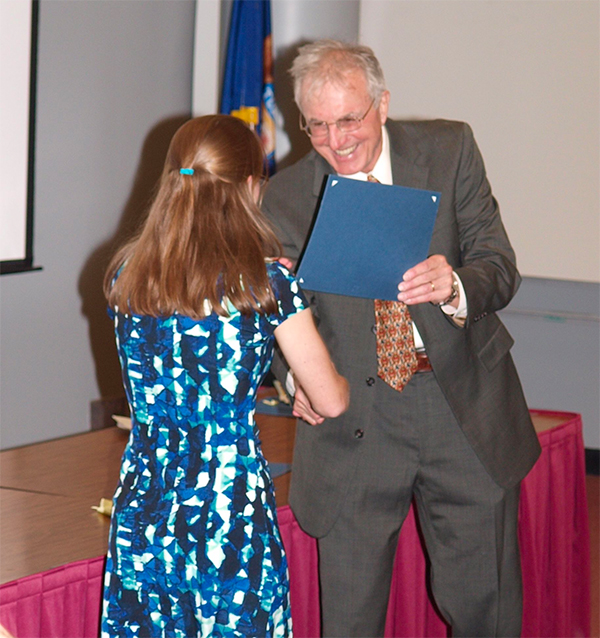
Mike's pride in student accomplishments was always visible in his enthusiastic smile.
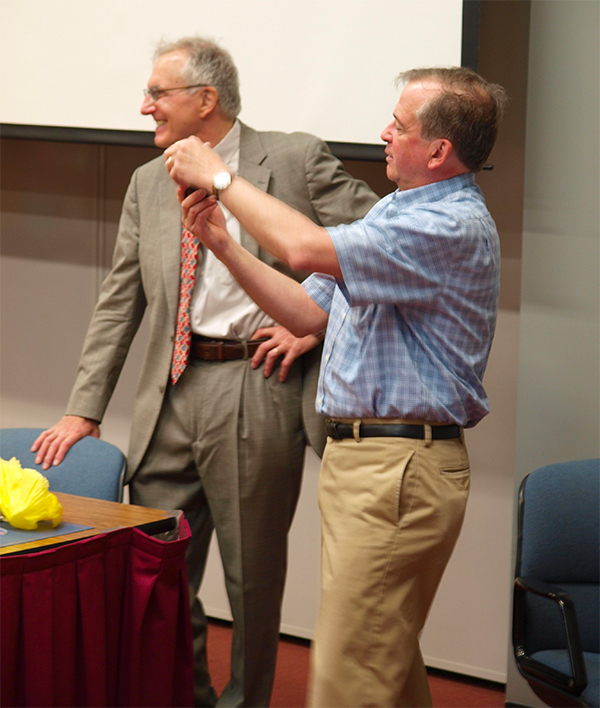
Mike was known for the joy he took in his work of advancing student success.
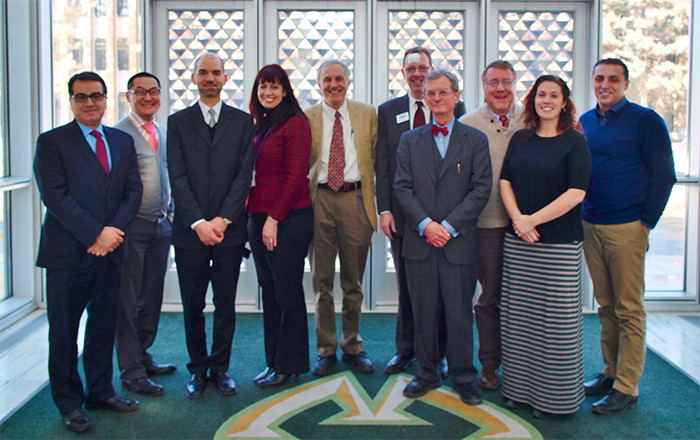
Mike, center, accompanied a group of HFC faculty to Wayne State University in 2015 to sign an articulation agreement with the WSU Honors College, facilitating the transfer of HFC Honors Program students to WSU.
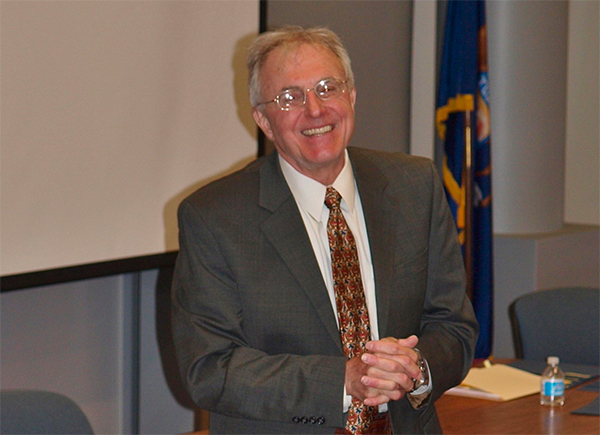
Nearly everyone who knew Mike talks about his smile, how often he displayed it, and the warm authenticity of optimism it created.
Questions about this website should be directed to communications@hfcc.edu.